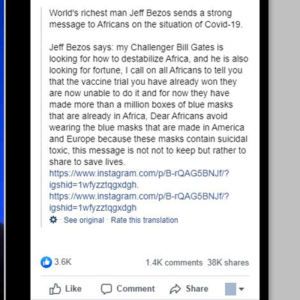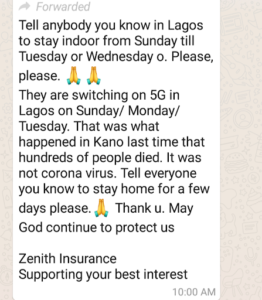“This virus does not exist. It’s just a ploy by the Nigerian government to receive financial aid.”
This was the reply I got from an acquaintance in Nigeria while discussing COVID-19. For many people, conspiracy theories like this are hilarious, but they are oblivious to the fact that many others believe they are true and act accordingly. A lot of us like novel and interesting news, and for this reason, the theories are spreading like wildfire.

Like the green snake under the grass, the problem of misinformation is a huge barrier that has been underestimated in the fight against coronavirus in Nigeria. COVID-19 cases have rapidly increased from just a hundred to over eight thousand in the space of three months, yet misinformation seems to be a more dangerous foe, especially with conspiracy theories rising from different nooks and crannies.
The fact that social media has no gate-keeping and anyone can spread information makes this an issue that is hard to control. Not too long ago, there was an audio message circulating via WhatsApp. It speculated that the Nigerian government was trying to force Nigerians to accept a vaccination which was deemed dangerous and would be disseminated around the country from helicopters and planes, thus people were being advised to hide in their houses. It sounds funny, but nevertheless, a lot of folks adhered to it and remained indoors on the speculated date. The danger is that with the fear of vaccination spreading so fast, it could be hard to get people to accept vaccines should one be found.
These messages are mostly circulated on WhatsApp and as such it is almost impossible to trace their origin. WhatsApp allows the sharing of media such as audio, videos and links, and since some of these audio messages are in indigenous languages, it doesn’t require literacy to understand, thus making these messages disseminate faster.

As a result of messages like this, many people have been made to believe that the virus is not dangerous or even nonexistent. Because people are being told that there is nothing to fear about the pandemic, they are now going out unprotected and acting nonchalant about safety measures.
In order to combat this issue, Nigerian health officials are partnering with social media. For example, there is now software for fact checking. Although some of these posts are in Pidgin English or indigenous languages and are thus hard to be properly verified, it’s a good start towards the fight against misinformation. Twitter is also tweaking its algorithm to promote correct information, yet it seems like the rumors are spreading faster than the virus itself.
Similar conspiracy theories have been spread in the United States and European countries too, but the issue here is that Nigeria is not fully ready should more people decide to invalidate the existence of COVID-19 and continue to engage in risky behavior. With overcrowded cities and health facilities that are not ready for the consequences of such behavior, dispelling false rumors is necessary to stop a disaster from happening. It is a very difficult task—especially when these theories make their way into legitimate newspapers, or religious fanatics would rather consume anointed oil than go to the hospital—but it is not impossible.
People who believe information like this should not be considered foolish, but rather, the factors that promote this should be considered. Firstly, many of them lack access to correct information, which is why they believe information that comes from sources that seem reliable to them.
Secondly, because data bundles are expensive in Nigeria, many people prefer cheaper options like WhatsApp-only bundles, or get their news for free from Facebook. It is nothing new that these platforms are well known for propagating fake news.
Finally, in a bid to understand what this pandemic means, people are relying on information that they get from social media.
Because these theories are increasing panic, promoting hate speech (particularly against China), and making people act in contradiction to authority, it is important that we make efforts to educate these people instead of simply disregarding or laughing about them.
Accurate information is a necessity, and to fight the virus everyone has to play a part. By realizing that controlling the spread of the virus starts with fighting misinformation, the pandemic would end faster than expected.


Leave a Reply